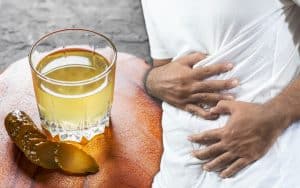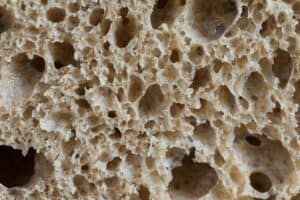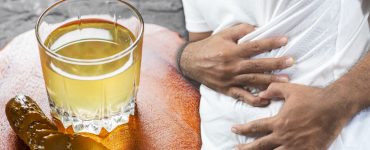A sore throat is a common ailment that can be caused by various factors, such as viral or bacterial infections, allergies, or vocal strain. It can be uncomfortable and affect our ability to speak, swallow, and eat. As a result, many people seek remedies for sore throat relief, ranging from over-the-counter medications to natural remedies.

One unconventional option that has gained attention in recent times is pickle juice. Yes, that tangy liquid leftover from your jar of pickles may have been touted as a remedy for sore throat. But does pickle juice really help with a sore throat, or is it just another old wives’ tale?
Can Pickle Juice Help with Sore Throat?
When it comes to using pickle juice as a remedy for sore throat, there are mixed opinions and limited scientific evidence to support its effectiveness. While some people may find relief from sore throat symptoms by consuming pickle juice, it’s important to understand the potential mechanisms behind it and consider the limitations.
Vinegar Content
Pickle juice contains vinegar, which is known for its antimicrobial properties. Vinegar has been used traditionally for its potential ability to kill bacteria, including those that can cause sore throat. However, the concentration of vinegar in pickle juice may vary, and the amount required to have a therapeutic effect is unclear.
Saltwater Gargles
Saltwater gargles are a well-known and proven remedy for sore throat. The salt in pickle juice may help soothe the throat and reduce inflammation, similar to saltwater gargles. However, the amount of salt in pickle juice may not be standardized and could vary between brands or homemade versions.

Other Components
Pickle juice also contains water and spices, which may help with hydration and provide some relief to a dry or scratchy throat. However, these components alone may not be enough to provide significant relief from sore throat symptoms.
Individual Response
Different individuals may have varying responses to pickle juice as a sore throat remedy. Factors such as the severity and cause of sore throat, overall health, and personal preferences can influence the effectiveness of pickle juice as a remedy.
How Pickle Juice May Help
While the scientific evidence on the effectiveness of pickle juice for sore throat is limited, there are some potential mechanisms through which it may provide relief. Here are some ways pickle juice may help with sore throat:
Antimicrobial Properties
Vinegar, which is a component of pickle juice, has been shown to have antimicrobial properties. It may help kill bacteria or inhibit their growth in the throat, which can be beneficial for sore throat caused by bacterial infections.
Saltwater Effect
Salt in pickle juice may have a similar effect as saltwater gargles, which are a well-known and proven remedy for sore throat. Gargling with saltwater can help reduce inflammation, soothe the throat, and potentially flush out harmful bacteria or irritants.
Hydration
Pickle juice contains water, which may help with hydration. A dry or scratchy throat can benefit from increased moisture, which may help alleviate discomfort and soothe the throat.
Electrolytes
Pickle juice contains electrolytes, such as sodium and potassium, which are essential for maintaining proper fluid balance in the body. Proper hydration and electrolyte balance can support overall throat health and potentially reduce sore throat symptoms.
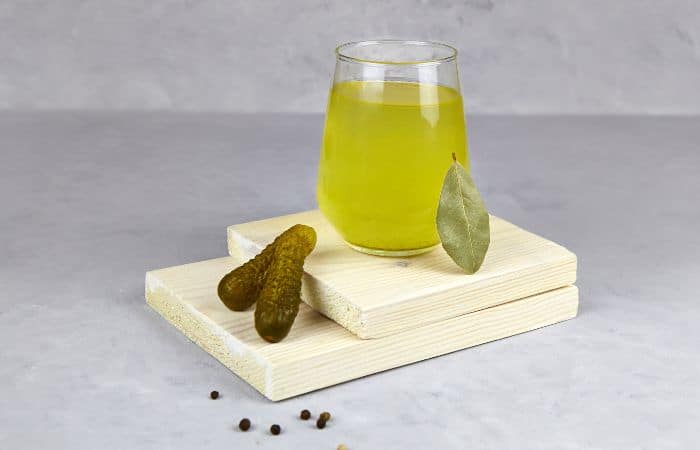
Spices and Herbs
Pickle juice may contain spices and herbs, such as dill, garlic, or mustard seeds, which can add flavor and potential therapeutic properties. Some herbs and spices are known for their anti-inflammatory, antibacterial, or soothing effects, which may provide relief for sore throat symptoms.
How To Use Pickle Juice for Sore Throat
If you’re considering using pickle juice as a remedy for sore throat, it’s important to follow proper usage guidelines to maximize potential benefits and minimize risks. Here are some tips for using pickle juice safely and effectively:
Choose High-Quality Pickle Juice
If you’re purchasing pickle juice from the store, opt for reputable brands that use natural ingredients and have proper food safety standards. If you’re making homemade pickle juice, ensure that you use fresh, clean ingredients and follow safe food handling practices.
Dilute Pickle Juice
Pickle juice is typically concentrated and can be quite salty or acidic, which may not be suitable for direct consumption. It’s recommended to dilute pickle juice with water or other liquids to reduce the intensity of the flavors and potential risks of consuming excessive salt or acid.
Use a Small Amount
Start with a small amount of pickle juice and gradually increase as tolerated. Avoid consuming excessive amounts of pickle juice, as it may lead to digestive discomfort or other adverse effects, especially due to its high sodium content.
Gargle or Sip
Pickle juice can be used as a gargle or a beverage. For gargling, mix a small amount of diluted pickle juice with warm water and use it to rinse your throat for about 30 seconds before spitting it out. As a beverage, sip on diluted pickle juice slowly to allow it to coat your throat.
Monitor for Adverse Effects
Pay attention to any adverse effects or changes in symptoms after using pickle juice for sore throat. If you experience any discomfort, allergic reactions, or worsening of symptoms, discontinue use and seek medical attention.
Can Pickle Juice Help with Different Causes of Sore Throat?
Pickle juice may potentially provide some relief for sore throat symptoms caused by different underlying causes, including viral or bacterial infections, allergies, or vocal strain. However, it’s important to note that pickle juice should not be used as a standalone treatment and should be used in conjunction with other proven treatments as recommended by a healthcare professional.

Sore Throats Caused by Bacterial Infections
Pickle juice’s antimicrobial properties, particularly its vinegar content, may help kill or inhibit the growth of bacteria in the throat, which could be beneficial for sore throat caused by bacterial infections. Gargling with diluted pickle juice may help reduce bacterial load and potentially alleviate sore throat symptoms.
Sore Throats Caused by Viral Infections
Most sore throats are caused by viral infections, such as the common cold or flu, which do not respond to antibiotics. Pickle juice’s antimicrobial properties may not be effective against viruses. However, the saltwater effect of pickle juice, similar to saltwater gargles, may help soothe the throat and provide temporary relief from sore throat symptoms, such as pain or inflammation.
Sore Throats Caused By Allergies
Allergies, such as post-nasal drip or seasonal allergies, can cause throat irritation and soreness. Pickle juice’s hydrating properties and electrolyte content may help moisturize the throat and provide temporary relief from dryness or irritation caused by allergies.
Sore Throats Caused by Vocal Strain
Overuse of the voice, such as excessive talking, singing, or shouting, can lead to vocal strain and sore throat. Pickle juice’s hydrating properties may help moisturize the vocal cords and alleviate some of the discomfort associated with vocal strain.
Alternatives Home Remedies to Pickle Juice for Sore Throat
In addition to pickle juice, there are several other home remedies that may potentially provide relief for sore throat symptoms. Here are some alternative home remedies to pickle juice for sore throat:
Honey
Honey has antibacterial and anti-inflammatory properties that may help soothe a sore throat. You can mix honey with warm water or tea, or simply swallow a teaspoon of honey to help coat the throat and reduce discomfort.
Saltwater Gargles
Gargling with warm saltwater is a common home remedy for sore throat. Dissolve half a teaspoon of salt in a glass of warm water and gargle with it for about 30 seconds, then spit it out. Saltwater can help reduce inflammation and ease pain in the throat.
Ginger Tea
Ginger has anti-inflammatory properties that may help reduce throat inflammation and soothe soreness. You can make ginger tea by steeping fresh ginger in hot water, adding lemon and honey for additional benefits, and sipping it slowly to help ease sore throat symptoms.
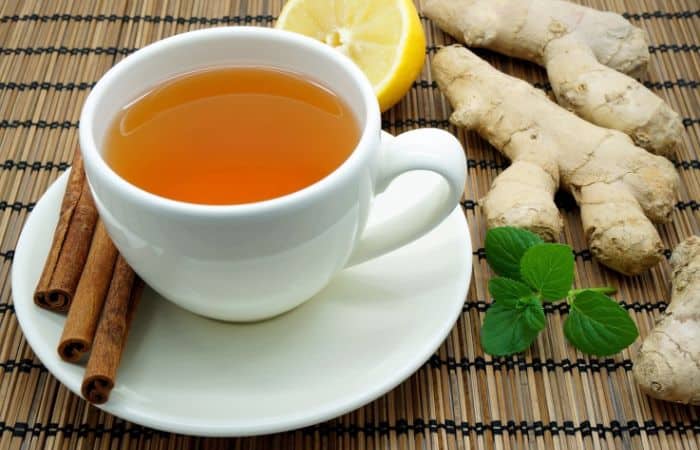
Steam Inhalation
Inhaling steam can help moisturize the throat and soothe irritation. Boil water and carefully inhale the steam by leaning over the pot with a towel draped over your head to create a tent. Be cautious to avoid burns and keep a safe distance from the hot water.
Marshmallow Root Tea
Marshmallow root has demulcent properties that may help soothe a sore throat by forming a protective coating on the throat lining. You can make marshmallow root tea by steeping dried marshmallow root in hot water, and drinking it warm for potential relief.
Slippery Elm Lozenges
Slippery elm lozenges are made from the inner bark of the slippery elm tree and have demulcent properties that can help soothe a sore throat. These lozenges can be dissolved slowly in the mouth to help coat the throat and reduce discomfort.
Conclusion
Pickle juice may provide some relief from sore throat symptoms, and it is worth trying if you do not have access to other remedies. The fact that pickle juice is low in calories makes it an ideal remedy for those looking for a more natural way to soothe their sore throat pain. However, it’s important to note that pickle juice should not be used as a substitute for conventional treatments prescribed by your doctor.


